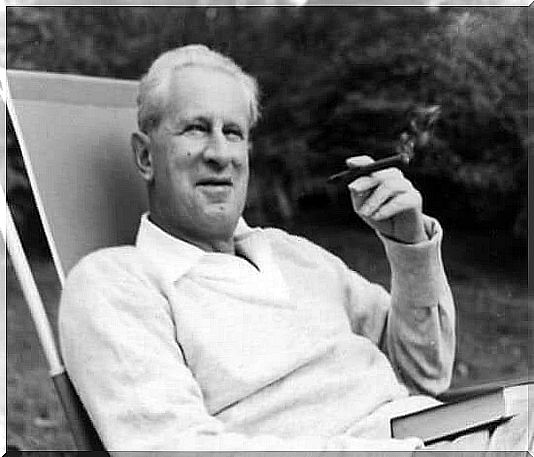7 Famous Phrases By Marcuse

There are many phrases by Marcuse that transcended time. This German-born philosopher had “a great obsession” that is reflected in most of his statements: freedom. This was the value that kept him up late and led him to interesting reflections.
Herbert Marcuse was persecuted by the Nazi regime, and perhaps that is why he learned to recognize the fundamental importance of being free. Like other contemporaries of his, he was also impressed by the degree of alienation that German society had reached with the Hitler phenomenon.
Marcuse’s phrases also embody a radical critique of capitalist society. He believed that, in addition to being an economic system, it was also an ideological system that ended up captivating even those it exploited. Without further ado, these are seven of his most famous phrases.
1. Intellectual freedom in Marcuse’s sentences
This is one of those Marcuse phrases that doesn’t make a lot of sense to many people these days. He talks about intellectual freedom, but in the contemporary world there are a large number of those who prefer to bow to the majority.
Unfortunately, in human beings today there is more desire to join the great mass than to reaffirm their individuality. Walking away from the herd is scary and uncomfortable. Therefore, intellectual freedom is not such a valued good.

2. Romanticism and defamation
This is one of those beautiful phrases by Marcuse that tell us about something that repeats itself endlessly in the world: the disqualification of those who dream of a change. They are called “romantics” or dreamers for the purpose of being ridiculed in some way.
That’s why Marcuse speaks of this word as a kind of slander. He says he’s condescending because it’s a subtlety. At the same time, he highlights that those who are classified as such, in one way or another, represent a form of leadership.
3. One of Marcuse’s quotes about learning
The philosopher is right; this comes from a field that many find dense and difficult. However, he believed that only what catches our attention generates learning.
In this case, the word entertainment refers to what causes us fun and pleasure. Anyone who thinks that learning is basically an intellectual function is wrong. At the root of all of this are strong affective components.
4. The human being as an instrument
The theme of freedom, slavery and servitude is recurrent in Marcuse’s phrases. In this case, he speaks of those realities in which the human being ceases to be an end in itself to become a means to something.
Any form of instrumentalization or use of a person reduces him to a level of servitude. It doesn’t matter if it happens in the work world, in the family or in a couple relationship. No human being should serve as a means for another to reach their goals.
5. The current slavery
This is another one of Marcuse’s phrases that may not make sense to many people these days. When the philosopher speaks of slavery, he refers to any kind of relationship in which a human being transforms another into an object in order to achieve something.
In this case, it refers to the industrial society. What Marcuse points out is particularly reflected in the middle classes, with incomes a little higher than the average. They believe that the relative freedom of consumption they have is true freedom, when it is just another sign of their enslavement.
6. Things own people
In this case, Marcuse refers to the power that consumer objects acquire over us. In today’s world, perhaps the most emblematic case is that of children’s toys. It can be said that they play with the child, not the other way around.
Adults also have their own “toys”. This is the case of the cell phone which, in many cases, leads to an absurd and compulsive game, which captures the mind and keeps it erratic. In this way he indoctrinates and manipulates.

7. The concept of alienation in Marcuse’s sentences
This is, without a doubt, one of Marcuse’s most interesting phrases. In it, he denounces the state of alienation present in contemporary society. The most serious is that it is a consented alienation. Many identify with it and try to live according to its logic.
As Foucault also said, people no longer need to be pressured to obey the system’s orders. They do it with gusto. In fact, they are afraid to be outside of that system. This has been one of the greatest triumphs of the powerful.
Marcuse was one of those philosophers with a universal vocation, and he will certainly last in time. His contribution nurtured great social movements and continues to be a beacon that illuminates the path of what obsessed him so much: freedom.









